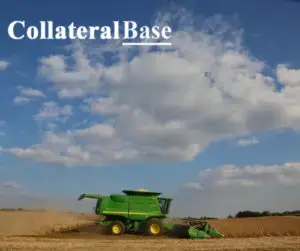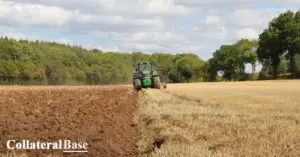
What is a UCC Agricultural Lien
As we detailed in our introductory article on security interests, a security agreement gives a creditor some form of legal right over the property of a creditor. While this definition is fairly straightforward, there are all kinds of quirks which are unique to agricultural liens. Under the 2001 amendment of Article 9 of the Uniform Commercial Code (UCC), agricultural liens are a special kind of interest for lenders.
810 ILCS 5/9-102(a)(5) defines an “agricultural lien” to mean an interest, other than a security interest, in farm products:
- (A) which secures payment or performance of an obligation for goods or services furnished in connection with a debtor’s farming operation;
- (B) which is created by statute in favor of a person that in the ordinary course of its business furnished goods or services to a debtor in connection with a debtor’s farming operation; and
- (C) whose effectiveness does not depend on the person’s possession of the personal property.
There are at least three types of statutory liens in Illinois that involve agriculture:
- agister’s lien;
- thresherman’s lien; and
- landlord’s crop lien.
What is an Agister’s Lien?
An “agister” cares for livestock. They have a special statutory lien set forth in §50 of the Innkeepers Lien Act, 770 ILCS 40/0.01, et seq.:
Agisters and persons keeping, yarding, feeding or pasturing domestic animals, shall have a lien upon the animals agistered, kept, yarded or fed, for the proper charges due for agisting, keeping, yarding or feeding thereof. 770 ILCS 40/50.
The agister’s lien is a possessory lien which extends animals in the care and possession of the farmer or rancher. Therefore, it does not fit the UCC definition of “agricultural lien,” and compliance with the filing requirements of Article 9 is not required.
What is a Thresherman’s Lien?
The next kind of lien, a a thresherman’s lien, is defined at §50a of the Innkeepers Lien Act:
Every person who, as owner or lessee of any threshing machine, clover huller, corn sheller or hay baler, threshes grain or seed, hulls clover, shells corn or presses hay or straw at the request of the owner, reputed owner, authorized agent of the owner or lawful possessor of such crops shall have a lien upon such crops, beginning at the date of the commencement of such threshing, hulling, shelling or baling, for the agreed contract price of the job, or, in the absence of a contract price, for the reasonable value of the services or labor furnished.
Such lien shall run for a period of eight (8) months after the completion of such services or labor notwithstanding the fact that the possession of the crops has been surrendered to its owner or lawful possessor, provided that such lien shall not be valid and enforceable against a purchaser of said crops from the owner or lawful possessor thereof unless the lien holder shall, previous to or at the time of making final settlement for such crops by such purchaser, serve upon such purchaser a notice in writing of the existence of such lien. 770 ILCS 40/50a.
 Unlike the agister’s lien, the thresherman’s lien continues after possession of the crops has been surrendered and therefore it fits the UCC definition of “agricultural lien.”
Unlike the agister’s lien, the thresherman’s lien continues after possession of the crops has been surrendered and therefore it fits the UCC definition of “agricultural lien.”
Consequently, the rules for perfection, priority, and enforcement of this lien are provided by Article 9. Perfection is achieved by filing a financing statement with the Secretary of State, and the priority rules of first to file apply. See 810 ILCS 5/9-310(a), 5/9-322.
What is a Landlord’s Crop Lien?
Lastly, for a landlord’s crop lien in Illinois, §9-316 of the Code of Civil Procedure, 735 ILCS
5/1-101, et seq., provides in part:
Every landlord shall have a lien upon the crops grown or growing upon the demised premises for the rent thereof, whether the same is payable wholly or in part in money or specific articles of property or products of the premises, or labor, and also for the faithful performance of the terms of the lease.
Such lien shall continue for the period of 6 months after the expiration of the term for which the premises are demised, and may be enforced by distraint as provided in Part 3 of Article IX of this Act.
A good faith purchaser shall, however, take such crops free of any landlord’s lien unless, within 6 months prior to the purchase, the landlord provides written notice of his lien to the purchaser by registered or certified mail. Such notice shall contain the names and addresses of the landlord and tenant, and clearly identify the leased property.
A landlord may require that, prior to his tenant’s selling any crops grown on the demised premises, the tenant disclose the name of the person to whom the tenant intends to sell those crops. Where such a requirement has been imposed, the tenant shall not sell the crops to any person other than a person who has been disclosed to the landlord as a potential buyer of the crops. 735 ILCS 5/9-316.
- Historically, the landlord’s lien was beyond the scope of Article 9. The most common priority dispute was between a UCC lien creditor and a landlord claiming a crop lien. The landlord’s lien usually prevailed. See Dwyer v. Cooksville Grain Co., 117 Ill.App.3d 1001, 454 N.E.2d 357, 73 Ill.Dec. 497 (4th Dist. 1983); Farmers Grain & Supply Co. v. Skinner, 161 Ill.App.3d 201, 514 N.E.2d 216, 112 Ill.Dec. 750 (3d Dist. 1987).
- However, with P.A. 91-893, the Illinois General Assembly amended the landlord’s crop lien statute to fit within the Article 9 definition of “agricultural liens.” Furthermore, by P.A. 92-819, in 2002 the legislature added the following provision to the statutory crop lien:
A lien arising under this Section shall have priority over any agricultural lien as defined in, and over any security interest arising under, provisions of Article 9 of the Uniform Commercial Code. 735 ILCS 5/9-316.
As a result of this law, the landlord’s statutory lien for rent against crops grown on leased land continues to be superior to any consensual lien that the tenant may give on the crops, even those created under Article 9. Schweickert v. Ag Services of America, Inc., 355 Ill.App.3d 439, 823 N.E.2d 213, 215, 291 Ill.Dec. 203 (3d Dist. 2005) (“The 2002 amendment restored the original language of the statute as it was before the 2001 amendment.”). Therefore, the statutory lien for landlords requires no financing statement to perfect the lien.
Limitations for Ag Liens Under Bankruptcy
While Illinois created protections for lienholders, those protections are a different story under bankruptcy. The landlord’s statutory lien for unpaid rent may be avoided under the Bankruptcy Code, 11 U.S.C. §101, et seq. 11 U.S.C. §§545(3), 545(4). See Marshall v. Aubuchon (In re Marshall), 239 B.R. 193 (Bankr. S.D.Ill. 1999); Pogge v. Powers (In re Smith), 302 B.R. 865 (Bankr. C.D.Ill. 2003).
If a landlord wants to prevail over a trustee in bankruptcy on the crop lien, the landlord needs a consensual security interest and a properly filed UCC financing statement. If a landlord fails to perfect by filing a financing statement, the statutory crop lien once avoided will relegate the landlord to the status of an unsecured creditor.
Whether this is your first land use issue or most recent, our office of experienced ag lawyers has helped people and businesses alike.





